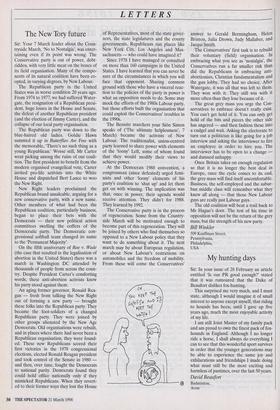LETTERS The New Tory future
Sir: Your 7 March leader about the Coun- tryside March, 'No to Nostalgia', was enter- taining even if its point was wrong. The Conservative party is out of power, debt- ridden, with very little meat on the bones of its field organisation. Many of the compo- nents of its natural coalition have been co- opted, in varying degrees, by New Labour.
The Republican party in the United States was in worse condition 20 years ago. From 1974 to 1977, we had suffered Water- gate, the resignation of a Republican presi- dent, huge losses in the House and Senate, the defeat of another Republican president (and the election of Jimmy Carter), and the collapse of our local party organisation.
The Republican party was down to the blue-haired old ladies. Goidle Hawn summed it up in Butterflies Are Free with the memorable, 'There's no such thing as a young Republican.' Worse still, Mr Carter went picking among the ruins of our coali- tion. The first president to benefit from the modern organised evangelical vote, Carter invited pro-life activists into the White House and dispatched Bert Lance to woo the New Right.
New Right leaders proclaimed the Republican brand unsaleable, arguing for a new conservative party, with a new name. Other members of what had been the Republican coalition, particularly business, began to place their bets with the Democrats — their new political action committees swelling the coffers of the Democratic party. The Democratic con- gressional softball team changed its name to the 'Permanent Majority'.
On the fifth anniversary of Roe v. Wade (the case that resulted in the legalisation of abortion in the United States) there was a march in Washington DC attended by thousands of people from across the coun- try. Despite President Carter's comforting words, these anti-abortion activists knew his party stood against them.
An aging former governor, Ronald Rea- gan — fresh from talking the New Right out of forming a new party — brought these folks into the Republican party. They became the foot-soldiers of a changed Republican party. They were joined by other groups alienated by the New Age Democrats. Old organisations were rebuilt, and in places where there had never been a Republican organisation, they were found- ed. These new Republicans scored their first victories in the 1978 congressional elections, elected Ronald Reagan president and took control of the Senate in 1980 and then, over time, fought the Democrats to national parity. Democrats found they could hold office nationally only if they mimicked Republicans. When they revert- ed to their former ways they lost the House of Representatives, most of the state gover- nors, the state legislatures and the county governments. Republicans run places like New York City, Los Angeles and Mas- sachusetts — who could have imagined it?
Since 1978 I have managed or consulted on more than 160 campaigns in the United States. I have learned that you can never be sure of the circumstances in which you will face that opponent. Sharing common ground with those who have a visceral reac- tion to the policies of the party in power is what an opposition needs to do. Some may mock the efforts of the 1980s Labour party, but those efforts built the organisation that could exploit the Conservatives' troubles in the 1990s.
The Bennite marchers your Sion Simon speaks of (`The ultimate helplessness', 7 March) became the activists of New Labour. The traditionalist, union-centred party learned to share power with elements of the 'loony' Left, some of whom found that they would modify their views to achieve power.
At the Democrats 1988 convention, a congressman (since defeated) urged femi- nists and other 'loony' elements of his party's coalition to 'shut up' and let them get on with winning. The implication was that, once in power, their agenda would receive attention. They didn't for 1988. They learned by 1992.
The Conservative party is in the process of regeneration. Some from the Country- side March will be motivated enough to become part of this regeneration. They will be joined by others who find themselves so opposed to a New Labour policy that they want to do something about it. The next march may be about European regulation, or about New Labour's restrictions on automobiles and the freedom of mobility. From these will come the Conservatives' answer to Gerald Bermingham, Helen Brinton, Julia Drown, Judy Mallaber, and Jacqui Smith. The Conservatives' first task is to rebuild their voluntary (field) organisation. In embracing what you see as 'nostalgia', the Conservatives run a far smaller risk than did the Republicans in embracing anti- abortionists, Christian fundamentalism and the gun lobby. They had no choice. After Watergate, it was all that was left to them. They won with it. They still win with it more often than they lose because of it.
The great grey mass you urge the Con- servatives to embrace doesn't really exist. You can't get hold of it. You can only get hold of the bits and pieces the other side has angered — and then fashion these into a cudgel and wait. Asking the electorate to turn out a politician is like going for a job interview and asking the interviewer to fire an employee in order to hire you. The interviewer has to be open to a change and damned unhappy.
Once Britain takes on enough regulation so that it is no longer the best deal in Europe, once the cycle comes to its end, the grey mass will find itself uncomfortable. Business, the self-employed and the subur- ban middle class will remember what they knew all along — that those New Labour guys are really just Labour guys.
The old coalition will beat a trail back to Mr Hague's door, The test of his time in opposition will not be the return of the grey mass, but the strength of his new party.
Bill Winkler
509 Kauffman Street, Pennsylvania, Philadelphia, USA




































































 Previous page
Previous page